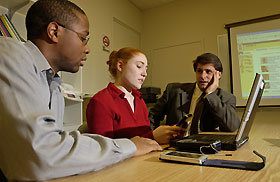For more archives, go to the Advance Archive/Search Page.
Grant Bolsters Curriculum,
Technology Use In Family Medicine
When third-year medical students begin their family medicine rotation, they’re loaned laptop computers and introduced to the McQ family who ‘live’ inside.
“The McQs are a teaching tool designed to orient our students to an entire family rather than to an individual,” says Dr. Thomas Agresta, associate professor of family medicine.
 |
|
Dr. Thomas Agresta, right, associate professor of family medicine,
instructs medical students Eve Cohen, center, and Fritzgerald Estinfa
on the use of hand-held computers in medicine.
|
The family includes a mother, a father, two children, and a set of grandparents, who exist in carefully crafted medical records detailing past visits to the doctor. The McQ curriculum was developed in paper form by the University of Massachusetts. It was moved to an electronic format three years ago by Agresta, with a $503,143 grant from the Health Resources and Services Administration of the Department of Health and Human Services, which supports pre-doctoral training in primary care.
Thanks to a new three-year, $592,578 grant, the McQ curriculum is being expanded, and other electronic technology is being introduced that will help medical students prepare for possible careers in family medicine.
In the McQ family, one of the children is about to marry a Latino, who will be incorporated into the electronic medical record.
“The marriage brings new members and new cultural issues into the family constellation, and that helps us expand the notion of culturally appropriate care,” says Agresta. “Hispanics often use traditional healing therapies or herbal supplements. Now if one of the McQ children comes to the doctor for asthma treatment, we want the students to realize they have to ask about the possible use of traditional remedies in the family.
“Students need to be aware of patients’ religion,” he adds, “because sometimes it plays a role in the kind of treatment they will accept. They need to think about cultural influences on diet, especially if heart disease or diabetes run in a patient’s family. It’s information students need to be aware of when they interact with patients, and we want them to ask about it.”
The new grant will also be used to equip students doing their family medicine rotation with technology that can make high quality information available while they are talking to patients. The information is loaded onto a hand- held computer about the size of a deck of playing cards. The tiny computer can provide detailed information on hypertension, diabetes, asthma, and a host of other conditions within seconds.
“We are helping medical students become familiar with the electronic technology that will be in place when they begin to provide care to patients,” Agresta says. “As science and knowledge about health care continue to grow, the technology will help physicians be lifelong learners, able to access relevant new information as it becomes available.”
If a patient comes in for a checkup and has high blood pressure, the student can call up information from clinical studies, calculate the patient’s risk of heart disease or stroke, get information on medications, and print out diet tips and guidelines to give to the patient right then.
“Doctors don’t have to step away from the exam room and away from the patient to consult a book or journal,” Agresta says. “They can get the information right in the exam room while they are with the patient.”
The hand-held computers also enable the students to keep information about the patients they see throughout their four years of medical school, which helps them make sure they have seen enough types of patients to ensure that they are competent.
“The students will know how many pregnant women they have seen, or how many children, or how many cases of hypertension or pneumonia, so they can get a feeling for how well rounded their training is,” says Catherine Weber, associate professor of family medicine.
The grant will be matched with funds from the School of Medicine that will be used to buy hand-held computers for about 100 community physicians who work with family medicine students during their training. The computers will enable the physicians to quickly take notes about a student’s performance and skills: whether the student took an accurate patient history, for example, and whether he or she conducted the physical exam appropriately.
Part of the grant also will be used to reach out to more community health centers as training facilities. Currently, family medicine students see patients at community centers in Meriden, Middletown, Hartford, and East Hartford.
“We want to expand opportunities for the students to work with diverse populations,” says Dr. David Henderson, assistant professor of family medicine, “and, by arming them with technology, we want to help them see these centers as exciting and fulfilling places to work.”

